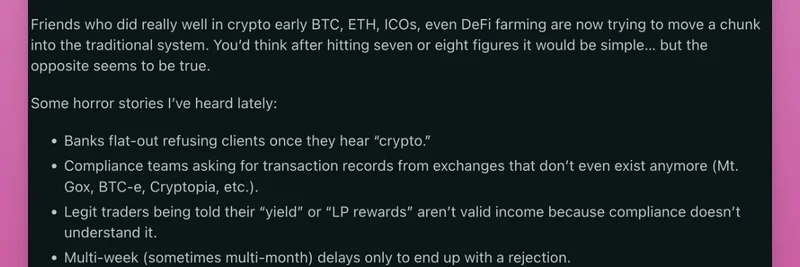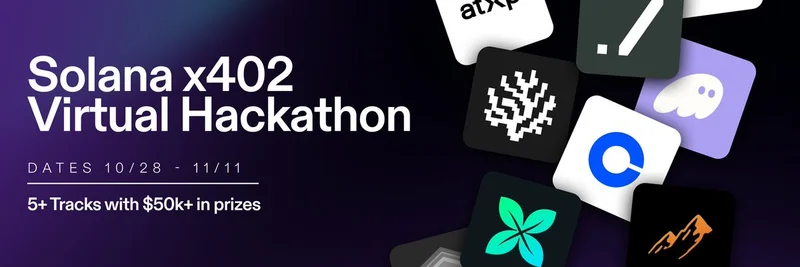In the fast-paced world of cryptocurrency, making seven or eight-figure gains from trading memecoins, airdrop farming, or yield strategies sounds like a dream come true. But what happens when you try to bridge those digital winnings back into the traditional banking system? According to a recent tweet from DeFi expert Ignas (@DefiIgnas), it's turning into a nightmare for many.
Ignas shares personal observations and horror stories from friends who've struck it big in early Bitcoin (BTC), Ethereum (ETH), initial coin offerings (ICOs), and even decentralized finance (DeFi) farming. DeFi farming, for the uninitiated, involves providing liquidity to decentralized exchanges in exchange for rewards—think of it as earning interest on your crypto holdings but with potentially higher yields and risks.
The core issue? Banks are increasingly wary of anything crypto-related. Once the word "crypto" enters the conversation, compliance teams kick into high gear, often leading to outright rejections or endless delays. Here are some of the chilling examples Ignas highlighted:
- Flat-out refusals: Banks shutting down clients the moment they learn the funds stem from crypto activities.
- Impossible record requests: Compliance officers demanding transaction histories from long-defunct exchanges like Mt. Gox (a infamous 2014 hack victim), BTC-e, or Cryptopia.
- Misunderstood income sources: Legitimate traders being told that "yield" from staking or "LP rewards" (liquidity provider earnings in DeFi pools) don't count as valid income because bank staff simply don't get it.
- Prolonged delays: What should be a straightforward transfer turns into weeks or months of back-and-forth, often ending in denial.
It's a stark contrast: people who've built wealth through savvy crypto moves are treated like pariahs in the banking world, all because their money originated in blockchain. Ignas poses a key question to the community: Has anyone successfully navigated private banking with serious crypto gains without drowning in compliance red tape? What strategies worked—or bombed?
Community Responses Shed Light on Global Variations
The tweet sparked a lively discussion, with replies pouring in from crypto enthusiasts worldwide. One user, Marc "七十 Billy" Zeller (@lemiscate), teased a future thread about his own compliance ordeal when buying a house with crypto proceeds. It hints at how these issues extend beyond simple cash-outs into major life purchases.
Another responder, @web3_attorney, shared a more positive take from their country (though they didn't specify which one). They noted that restrictions have eased up—previously, any crypto mention in transactions could freeze accounts, but now blockchain adoption is smoothing the path for freer movements.
Others echoed the frustration. @momotavrrr joked about entering the "7 figs club," while @Defi_Warhol called it a "super important topic" and bookmarked for more insights. @uwwgo suggested using services like Peanut for easier bridging, and @_yeminiz pointed out that cashing out is the question everyone avoids.
These responses highlight a patchwork of experiences. In some regions, anti-money laundering (AML) rules—designed to prevent illicit activities—are strictly enforced, requiring detailed source-of-funds proofs. In others, evolving regulations are making it easier. For memecoin traders, who often deal with volatile, high-reward tokens like those on Solana or Base chains, this adds another layer of complexity. Memecoins, powered by community hype and viral trends, can generate massive gains quickly, but proving their legitimacy to banks? That's a whole different game.
Why This Matters for Meme Token Enthusiasts
At Meme Insider, we're all about demystifying meme tokens and the broader blockchain ecosystem. This thread underscores a critical pain point: while memecoins offer explosive growth potential, realizing those gains in fiat can be tricky. If you're farming airdrops on platforms like Pump.fun or trading viral tokens, plan ahead for the off-ramp.
Tips from the community suggest starting small—test with minor withdrawals to gauge your bank's stance. Consult crypto-savvy lawyers or use intermediary services that specialize in fiat conversions. And always keep meticulous records: blockchain transactions are traceable, so tools like Etherscan (etherscan.io) or Solscan (solscan.io) can help document your journey.
As crypto matures, expect more integration with traditional finance. But for now, threads like this remind us that the road from wallet to bank account isn't always smooth. If you've got your own story, share it in the comments below—we're building a knowledge base to help everyone level up in this space.




